-
|
13 April 2018
|Posteado en : Reportage
The Ghana-ARAP Project relies on institutions to get the public involved. According to Transparency International, sub-Saharan Africa is the worst–rated region in this respect
Ministry of Justice of Ghana“Having to pay for a service we have a right to receive – do you think that is corruption?” Barbara Mensah asks the people of Ghana, referring to one of the most burning questions of our time. She is one of the Civic Education Officers responsable for investigating perceptions of corruption in Ghana.
“I am going to ask about certain practices, you tell me if you think they are corrupt” was the question put by another of these officers, Jafaru Omar. Through a questionnaire, officers appointed by Ghana’s National Commission for Civic Eduction (NCCE) survey the views of citizens in different parts of the country.
On the ground, the findings are already clear: of the 8672 responses, over half those surveyed (58.4%) have been witnesses to some form of corruption. Henrrieta Assante-Sharpong, in charge of the investigation, says: “the findings show that although Ghanaians are aware of corruption, they have very little knowledge of the various ways it may be practised.”
The NCCE was set up for the purpose of increasing public awareness: “Our lives are going backwards. We don’t have roads, there is no electricity. The money gained from corruption could have been used for these services”, says Aluliga Malpang, a farmer from the Tengzuk Community. Sub-Saharan Africa is the worst-rated region for corruption, according to the most recent report from Transparency International.
Cooperation in a hostile climate
The report on the Corruption Perceptions Index (CPI) rates 180 countries and territories according to perceived levels of corruption in the public sector, using a scale of zero to 100, where zero is extremely corrupt and 100 highly transparent.
New Zealand and Denmark are highest-placed in 2017, with scores of 89 and 88 respectively. Syria, South Sudan and Somalia have the lowest scores, with 14, 12 and 9 respectively. Ghana is in 81st place, with 40 points – a score above the average for the sub-Saharan region (32 points).
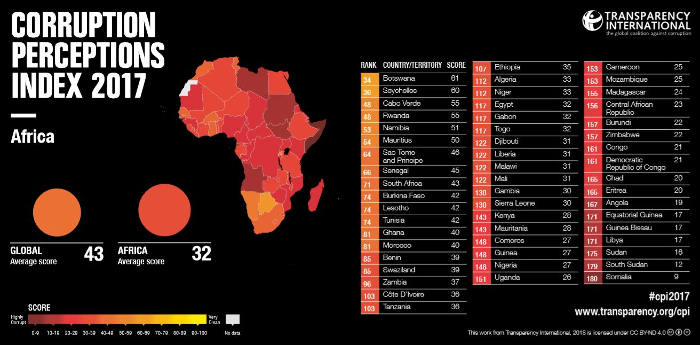
Nevertheless, the study shows that over two-thirds of countries had scores below 50. Transparency International works internationally and locally in over 100 countries in the world: “giving a voice to the victims of corruption, working with governments, undertakings and citizens to stop the abuse of power or bribery”. It states that most countries are making little or no progress in putting an end to corruption.
Ghana does not want to be in that category. Its initiative is part of the Anti-Corruption, Rule of Law and Accountability” programme. It is a project in support of transparency, with the aim of reducing corruption and improving accountability in the African country. For four and a half years, FIIAPP has been managing this programme, financed by the European Union, in collaboration with GIZ (Germany) and the Organisation for Economic Cooperation and Development (OECD).
“I want to help solve the corruption problem”, said Joseph Samuel Bebefiankom, a student in Kwashieman (Accra). Like him, other citizens say “it could be reduced, cut back”, “that will provide jobs for a lot of people” “it will help the country to develop.” They know what they want to achieve, but not how to achieve it.
A number of Ghanaian public institutions such as the NCCE, in collaboration with FIIAPP, have designed a strategy to involve the public, as well as others, in the struggle against corruption. One of the priorities of Ghana-ARAP is to raise their awareness of the importance of reporting it.
The more leaders that get involved, the less corruption there will be
The África no es un país [‘Africa is not one country’] blog reminds us, in the same report, that “2017 has seen the fall of a number of rulers accused of encouraging corruption”: Yahya Jammeh in Gambia, José Eduardo dos Santos in Angola, Robert Mugabe in Zimbabwe and, already in 2018, Jacob Zuma of South Africa.
George Obeng Obei is another Civic Education Officer. He says “people without much education don’t know how things are done in assemblies and in institutions. But they do believe there are elements of corruption in them”, Not knowing how it works doesn’t mean they don’t see it. They know, they are aware, according to Obeng Obei, that you can only get things with money. And this mindset has to be changed.
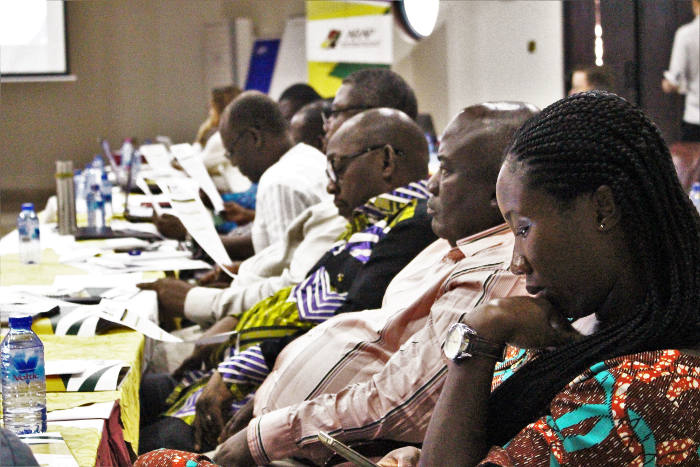
ARAP Ghana workshop According to Transparency International, it is the right time to “redefine” the problem in Africa, as, in some cases, the CPI points to a “hopeful future” for the continent. In spite of being the worst region overall, some countries have made significant progress, such as Botswana (61), which has a higher rating than Spain (59).
The key, according to the organisation, is that these countries have “a political leader committed to fighting corruption.” That is why they go further in developing laws and institutions in this regard. Ghana is making efforts in this direction, and its government has introduced a National Anti-corruption Action Plan (NACAP) to steer the project.
If the public at large also gets involved, success will be one step closer. The president of the NCCE, Josephine Nkrumah, knows this. She assesses the investigation conducted in the country: “NCCE will use this report to create civic education actions. To win the battle, we have to get both the public and the private sector involved. And what is even more important is getting every Ghanaian man and woman involved.”
“Winning the fight against corruption” is the African Union (AU)’s motto for 2018. This phrase could be said to apply to almost the whole world. It stems from the premise that “corruption rewards those who disobey the rules, destroying all the endeavours of constructive, just and equitable governance”.
The areas investigated in Ghana are shown in this video:
-
|
08 March 2018
|Posteado en : Reportage
Agenda 2030 counts on cooperation as a tool for advancing the gender equality that is being publicly demanded
“On International Women’s Day, we must commit ourselves to doing everything possible to overcome entrenched prejudices, support participation and activism, and promote gender equality and the empowerment of women”. These are the words of António Guterres, Secretary General of the United Nations, on International Women’s Day. Another 8 March for reflecting on what has been achieved and what remains to be done in terms of equality.
In 1995, almost 200 governments signed a historic road map in Beijing for achieving equal women’s rights. Two decades later, movements in favour of that equality continue to fill the streets and social networks throughout the world. In the face of this joint and global progress, international cooperation can be a key tool to achieving this equality.
Mar Merita, a technician specialising in gender with the EUROsociAL+ programme – which is funded by the European Commission and managed by FIIAPP – affirms how much innovation has taken place regarding the role of women in the Agenda 2030 framework for cooperation.
From ensuring that children have an equitable and high quality education, through ending all forms of discrimination and violence against women and girls throughout the world, to making equality one of the Sustainable Development Goals (SDG) established by several world leaders for a better world in 2030.
Equality in the EU
Gender equality is also one of the founding values of the European Union, which closely follows these development objectives. It also analyses progress towards these objectives through a periodic study.
The latest one (Sustainable Development in the European Union, 2017) provides data on four specific areas that serve as indicators when evaluating the goal of equality: gender violence, access to education, employment and positions of responsibility.

Gender violence is a reality in the EU in 2012. Where one in three women say they have experienced physical or sexual violence since they were 15 years old. This problem is the cause and consequence of inequality, and the fight against it begins the moment children gain access to education.
However, the fact that men drop out of school earlier and women are more successful in this area is not reflected in the employment rate of recent graduates, which is higher for men. In addition, the proportion of men of working age in employment exceeds that of working women by 11.6%.
Employment is one of the areas that is most linked to gender roles, family responsibilities and traditions. And it is reflected in the wage gap: in 2015, according to the same study, women earned 16.3% less per hour than men. The same difference as 5 years ago.
Progress has a cost in what Mar calls the “third generation of rights”, which would include this difference in wages that continues to be significant in most countries. According to the expert from EUROsociAL+, despite the progress in the recognition of political rights, there is still work to be done regarding social, cultural and economic rights; through which that “real equality” would be achieved.
The distribution of political positions and positions of responsibility also reflects inequality, since women do not usually have as much representation as men in decision-making processes. While the proportion of seats held by women in national parliaments has increased since 2003, women still held less than one third (28.9%) of these seats in 2017.
Cooperation as a tool
Many of these issues, such as the wage gap and sexual harassment, are the focus of current events. These have included public denunciations, with a strong international impact, which nevertheless need “processes for dealing with these problems”.
Dominique de Suremain, coordinator of the gender equity policy area for the EUROsociAL+ programme, believes she sees “less visible work for change” when these demands materialise and are reflected in the system.
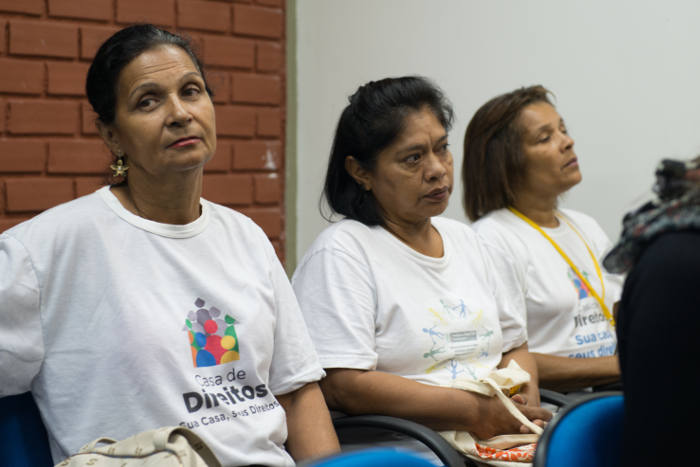
This is where cooperation comes into play, it has an essential role in the implementation of public policies that take these demands into account. It is important, according to Dominique, “to introduce that concern into the design of the projects” from the outset. It is a cross-cutting issue that must not only be applied in social projects, but it is also relevant for all the themes.
An example would be the gender focus workshop organised by ARAP Ghana – an anti-corruption project managed by FIIAPP – or the inclusion of this perspective in the activities of Euroclima+. In the end, inequality is inherent in the society in which it occurs and it influences the problems that society addresses.
However, this approach is often insufficient to achieve real equality. We must go beyond the diagnosis, the indicators, to quantify how many women have benefited: “We must take advantage of cooperation projects in order to play a proactive role,” according to Dominique.
Perhaps for this reason, EUROsociAL+ is one of the first programmes to create an exclusive thematic area to address this problem. A strong gender component or axis that has direct actions and a team of people exclusively dedicated to it.
Cooperation is based on an exchange of experiences, which is also important for Mar Merita: “you can fight inequality by promoting examples and good practices that arise in countries”, by learning from each other.
“Equality is a universal cause” and a realistic objective that, within the framework of the projects, needs public policies in order to make practical progress. Although in the end what is really important, according to the expert, is to believe in it.
Listen to the programme dedicated to International Women’s Day on our space on Spanish National Radio
-
|
15 February 2018
|Posteado en : Reportage
Cities are becoming key hubs from which to fight climate change. In Latin America, Euroclima+ supports mitigation policies to reduce emissions
"Sustainable cities" are one of the Sustainable Development Goals (SDG)When pollution levels increase, public transport in Paris is free. And only “clean” vehicles can enter the city. In Brussels and Copenhagen, priority is given to bicycles. Or the speed limit is reduced, as in Madrid. While London, Oslo and Stockholm use tolls to restrict traffic.
Other measures taken by the transport sector to reduce urban air pollution include prizes for green cars and controlling traffic flow and parking, encouraging car sharing and public transport. Urban air pollution is one of the most visible effects of climate change in cities around the world.
Outside of Europe, Tokyo monitors pollution in real time, with indexes that can be viewed online. Checks on the street, fines and lists of offenders are some of the other measures taken in one of the most populated cities in the world.
And the majority of the world population lives in cities. Making the adoption of an urban perspective on climate change necessary, as it is estimated that 70% of the population will be urban in 2050. Uses associated with the network of cities produce more than 70% of CO2 emissions.
Climate change and health
An article reflects on whether we are aware of what urban air pollution means. On whether we are aware that poor air quality affects our health. And on whether we are aware that it causes thousands of premature deaths a year. And it is backed up by data: 1,032,833 deaths per year in China, 621,138 in India, 54,507 in Ukraine, 32,668 in Turkey, 26,241 in Brazil, 26,160 in Germany and 16,798 in Mexico.
Euroclima+, the European Union-financed programme to tackle climate change in Latin America, supports the development of mitigation policies directly related to the reduction of greenhouse gases and other emissions.
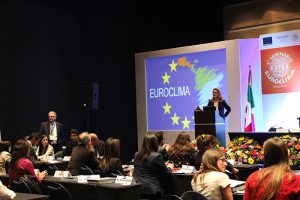
Euroclima+ meeting in Chile In addition, other specific plans with this objective are being developed in the industrial and transport sectors. They are necessary because a growing population means that current production and consumption patterns are running up against limited resources. A calculation of the ecological footprint shows that if no action is taken by 2030 we will need the equivalent of two planet Earths to cover our needs.
The programme is present in 18 Latin American countries and works in accordance with the United Nations Convention on Climate Change and according to the needs of a region that hosts some of those expanding cities.
Climate change in the Sustainable Development Goals
The climate governance component of Euroclima+ is being led by FIIAPP. Another of the programme’s tasks is to evaluate these climate policies, which will allow the associated actions to be redefined or redesigned in accordance with the framework agreements or compliance with the Sustainable Development Goals (SDG). These are the 17 goals several world leaders established in 2015 for a better world in 2030. And which, in summary, aim to “end poverty, fight inequality and stop climate change”.
Among them, number 11 refers to “sustainable cities” with a section on “environmental impacts” and number 13 focuses on action against climate change.–– But, how are things progressing with them?
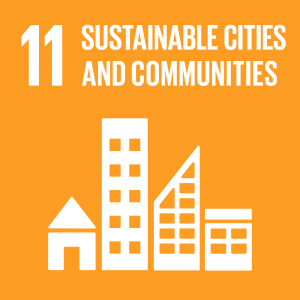
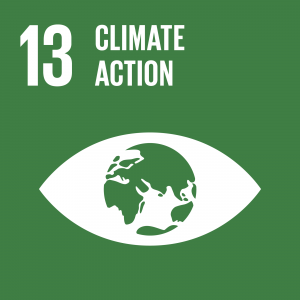
The European Union is studying progress towards these goals. In its latest study (Sustainable development in the European Union, 2017) it determined that the concentration of population and industry continues to be a risk for air quality. Despite the advances, the levels of air pollution continue to be above those recommended by the World Health Organization (WHO).
However, as part of its strategy for 2020, the EU set the goal of reducing greenhouse gas emissions by 20%, compared to 1990. The goal for 2015 has already been exceeded, with a reduction of 22%.
The cities are also commited
In this context, cities are aware they need to be involved. And they advocated this at the last UN Climate Summit (COP23), held in Bonn in November 2017, by calling for more tools to combat climate change.
Specifically, the reduction of greenhouse gas emissions was addressed with the ultimate aim of slowing down global warming. The objective remains that terrestrial temperatures do not increase more than 2 ºC by 2050. To achieve this, emissions must be reduced by 80%.
Euroclima+ also attended the meeting, where it met with ministers from several countries in the region to follow up on the objectives they have already committed to under the Paris Agreement (COP21) and to strengthen the dialogue on climate policies.
Many of the cities that met in Bonn also belong to the C40 network, which brings together more than 90 cities to combat the impacts of climate change by working collaboratively. The main objectives include “reducing greenhouse gases and increasing the health and well-being of citizens”.
This network alone represents “more than 650 million people and a quarter of the world economy”, making cities a priority when it comes to addressing this problem.
An example of this commitment is reflected in the short documentary released on the internet on the work of 6 cities: Bogota, Cape Town, New York, Paris, Portland and Seoul.
In reality, the next step is for us, as individuals, to also be aware that these measures are not intended to make our lives more difficult. On the contrary, they will allow us to live in the future.
The trick is to change some habits, with small gestures, however insignificant they may seem. More than 7,000 million small gestures can defeat climate change.
-
|
12 January 2018
|Posteado en : Reportage
The First Journalistic Feature Contest organised by SC-CONALTID and FIIAPP seeks to make the fight against these crimes visible within the framework of the project to support Bolivian institutions
Representative mural of La Paz (Bolivia)“At 27, Noelia has experienced more than anyone of her age; she is one of the five women who are interned in the Drug Dependants ward at the San Juan de Dios Psychiatric Hospital in Cochabamba, for polydrug use…”
Thus begins Moments of pleasure in exchange for a life of suffering, the winning story in the First Journalistic Feature Contest “Prevention of Drug Taking and Fight Against the Smuggling and Trafficking of Persons”. Laura Manzaneda Barrios, a journalist for The Times in Bolivia, narrates the life of a drug addict who loses custody of her children and arrives at an institution to rehabilitate herself.
According to the Latin American Observatory on Drug Policy and Human Security, 97% of the population considers drug use to be a social problem. Moreover, the fact is that the country is the epicentre of drug trafficking.

Laura Manzaneda receives first prize The portrayal of positive experiences in the prevention of drug use or in the fight against the trafficking and smuggling of persons is the goal of this contest organised by SC-CONALTID and FIIAPP, within the framework of the project to support the fight against drug trafficking and related crimes.
A story that seeks to provide training for Bolivian institutions in the fields of operational criminal investigation, intelligence, the control of borders and merchandise, money and asset laundering, people smuggling and trafficking.
This last problem is the subject of the second award-winning story: I woke up from the network, I dodged people trafficking, from the presenter of Red Bolivisión Víctor Hugo Rojas Chávez.
“Accepting an unknown yet attractive person as a contact was the quickest way to misery, a ticket she acquired when answering the first “hello, how are you?” in a web chat… the rest only a game of warm and flattering words in the midst of a vibrant plague of emoticons of kisses and hearts… that was the journey that led her along this path, a path of no return and at the highest price”.
The fragment reflects the principle of the many cases of what UNICEF considers “a modern form of slavery”. The main victims of human trafficking are children, adolescents and women who are seduced for the purpose of sexual exploitation or forced labour.
According to United Nations (UN) estimates, more than 2 million people are victims of human trafficking every year. And a study promoted by the Organization of American States (OAS) noted that Bolivia is one of the countries with the highest rate of people smuggling and trafficking in the region.
Institutional action is fundamental
The project managed by FIIAPP – funded by the European Commission and the State Agency for International Cooperation for Development (AECID) – focuses on the formation of Bolivian institutions so that they can cope with the problem.
Making it visible with activities like this is the first step. But there is a need for coordinated work by public and international entities. And in the end, the involvement of these institutions is fundamental. Thus, the third prize winner, professor of Social Communication (UMSA) Ramiro Reynaldo Quintanilla Ramírez, says at the end of his story: People trafficking is a silent crime that threatens Bolivia.
“Mothers will continue to look for their daughters, victims will try to extricate themselves from the horror which surrounds them and the money will never be enough to deal with such a lucrative and dangerous crime. However, there is hope for society as long as there are institutions that care about the pain of others.”
To read the full stories, click here
-
|
16 November 2017
|Posteado en : Reportage
The European Commission Programme aims to give technical assistance to countries to guarantee the safety of their citizens
In Latin America there are 23 homicides for every 100 thousand inhabitants. This figure is double the amount for Africa and five times the amount recorded in Asia. What’s more, with only 9 per cent of the world’s population, Latin America accounts for more than 30 per cent of the violent killings committed worldwide each year.[i]
Many of these are related to organised crime. This is one of the reasons why the sense of insecurity experienced by citizens has increased in recent years, making it a priority for these countries.
For many years, different policies to combat organised crime were tried out in Latin America. Some were repressive and others more moderate (such as “mano dura” or “iron fist” and the converse “mano blanda” approach applied in Guatemala from 2007 to 2015), with the feeling that the problem was not effectively dealt with. The reasons are many and varied, but the periodical and “short-term” nature of these policies may explain their ineffectiveness. One of the main lessons learned was the correct use of more global and long-lasting policies to identify and end insecurity in the region.
This is where EL PAcCTO (Europe Latin America Assistance Programme Against Transnational Organised Crime) comes onto the scene. A European Commission programme with pioneering content as it is the first time the whole criminal justice chain is dealt with as a whole. More specifically, it focuses on three areas (police, judicial and fiscal and the prison system) with five transversal work focuses (cyber crime, corruption, human rights, gender and money laundering) and the inclusion of two intrinsically linked projects (AMERIPOL and another project managed by Interpol). It is, therefore, an ambitious and complex project which will try to tackled the problem of organised crime in the most global and effective way possible by providing technical assistance to 18 Latin American countries (Argentina, Bolivia, Brazil, Chile, Colombia, Costa Rica, Cuba, Ecuador, El Salvador, Guatemala, Honduras, Mexico, Nicaragua, Panama, Paraguay, Peru, Uruguay and Venezuela).
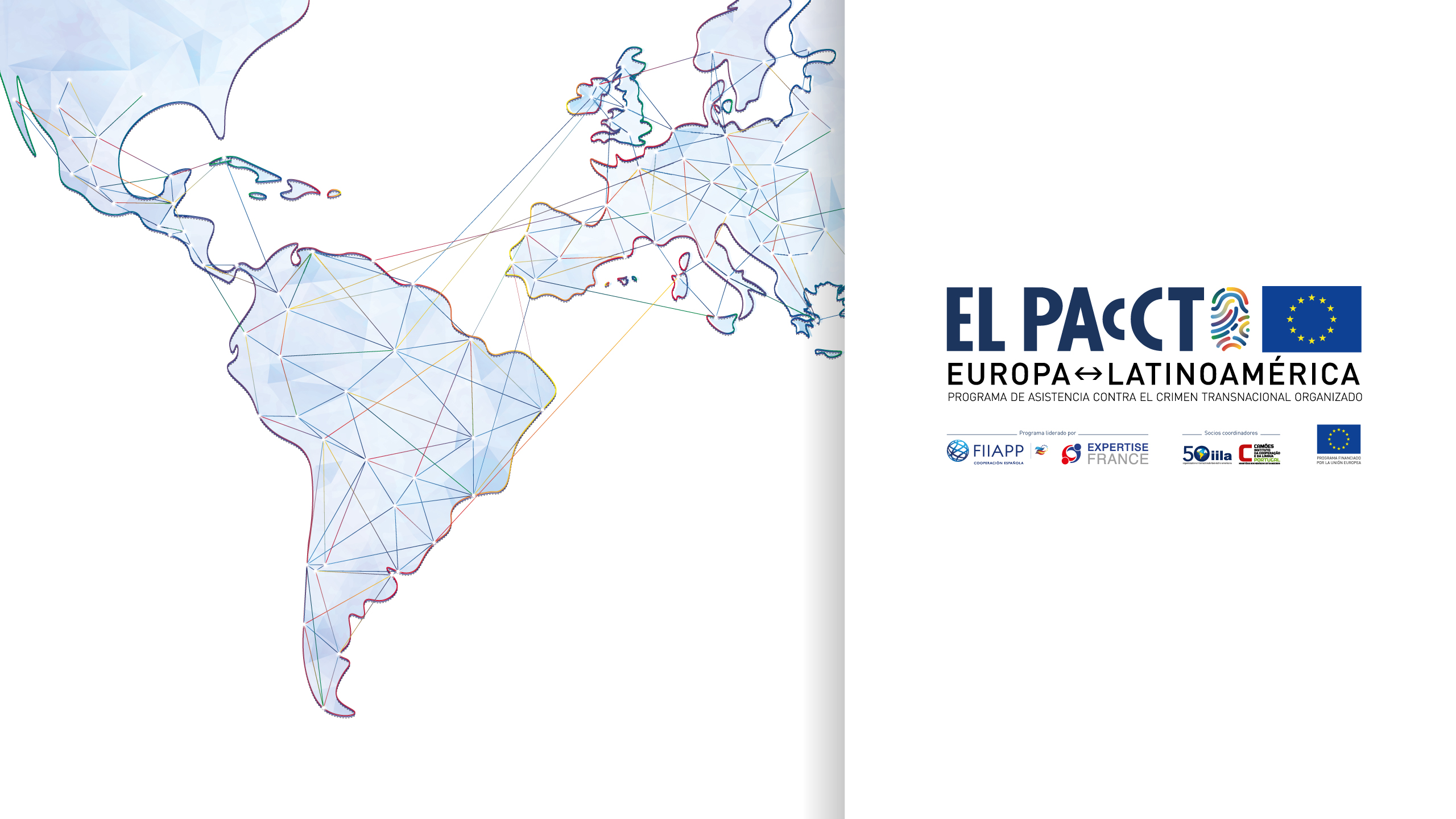
The International and Ibero-American Foundation for Administration and Public Policies (FIIAPP) and Expertise France (EF) coordinate the project along with two partners, the Italo-Latin American Institute (IILA) and the Camoes Institute.
The Programme will facilitate peer learning, South-South cooperation and the transfer of best European practices, and will be focused on public administrations. To do this, it will have the support of the Spanish General Council of the Judiciary, Ministry of the Interior via the Civil Guard, National Police and Prison Institutions, Ministry of Justice, the Public Prosecutor and their analogues in France, Italy and Portugal.
EL PAcCTO seeks to create concrete guides and tools for international action, approval and cooperation, both regionally and between Latin American countries and EU Member States. This way, it aims to eliminate border using legal and technical solutions that make Latin America a free and safe space united against organised crime.
The Programme is trying to respond now to all of the urgent demands from the countries because the aim of the programme is to build a safer society which benefits everyone. This is why it is important to increase social awareness about the dangers of organised crime. It is a matter of great importance to guarantee people’s rights, freedom and lives.
[i] Highest murder rates in the world by city (2016), World Atlas. Available at http://www.worldatlas.com/articles/most-dangerous-cities-in-the-world.html
María Jesús Martín is a Communication Technician at EL PAcCTO (Europe Latin America Assistance Programme Against Transnational Organised Crime) comes onto the scene.
-
|
13 October 2017
|Posteado en : Reportage
Representatives of the Ministry of Health, the Institute of Social Security and the Institute for Access to Public Information travelled to Madrid with the support of EUROsociAL+ to find out more in situ about the Spanish experience with managing hospital medical records
When Margarita went to her Social Security hospital in El Salvador for her regular type 2 diabetes check-up, her medical record had disappeared. After hours of fruitless searching, she went in to see her doctor with a temporary (empty) file so that he could prescribe the appropriate medicines. Due to the lack of medical information, the doctor told her that he could not prescribe her glimepiride, one of the key drugs for treating her diabetes, until he had some accurate analyses of her medical condition. Margarita had to wait almost a month to get the result of the new clinical analyses, without receiving proper medication in the meantime. After nearly three months, the file was finally found, surprisingly, among the records of those who had died.
Managing medical records properly is essential for improving the treatment of patients and the exercise of their rights, as well as the effective and efficient functioning of the healthcare system. However, this is a daunting task that requires confronting huge challenges, such as a lack of storage space or human and financial resources. At the same time, the patients’ personal details must be properly protected and the complex process of transferring the files from a paper format to an electronic one must be carried out in stages.
Well aware of the pressing need to tackle this issue in El Salvador, the Institute for Access to Public Information (IAIP), the Ministry of Health (MINSAL) and the Salvadoran Institute of Social Security (ISSS) have joined forces with the aim of building the foundations for a new era in the management of medical records in this Central American country’s public healthcare sector.
The EUROsociAL+ Programme, funded by the European Commission and managed by the FIIAPP, is helping El Salvador with this process. As a first step, between 25 and 28 September, representatives of the three Salvadoran institutions visited Madrid to find out about the progress made and the challenges faced by Spain in this area. For a week, they were able to exchange experiences and lessons learned with the Ministry of Health, Equality and Social Services, the Castilla-La Mancha Health Service (SESCAM), the Community of Madrid’s Hospital Clínico San Carlos, the Ministry of Education, Culture and Sports General Sub-Directorate of State Archives and the Spanish Data Protection Agency. The visit included a tour of the Hospital Clínico San Carlos archives and the Central Archives of the State Administration in Alcalá in addition to a presentation of the lessons learned from the Tunisian electronic file project headed by the FIIAPP and funded by the European Union.
This activity was the first step in promoting inter-institutional dialogue in El Salvador, advancing toward creating operating instructions and new regulations, and promoting cultural change, which is needed in order to improve the quality of healthcare in this Central American country.
Borja Díaz Rivillas, Senior Officer of Democratic Governance. EUROsociAL+







